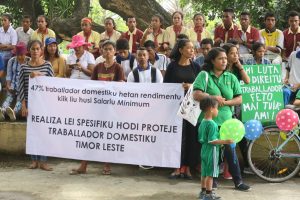The Story of ANGELA
 In 1999, Angela was a confident young woman of 24 whose eyes flickered with passion and resolve despite her trauma. She had broken the silence about her abduction and rape at the hands of a militia under the control of Indonesia’s military. Months after the arrival of peacekeepers, her courage led to a UN investigation, and later a groundbreaking conviction of rape as a crime against humanity in a court established by the UN and the Timorese government.
In 1999, Angela was a confident young woman of 24 whose eyes flickered with passion and resolve despite her trauma. She had broken the silence about her abduction and rape at the hands of a militia under the control of Indonesia’s military. Months after the arrival of peacekeepers, her courage led to a UN investigation, and later a groundbreaking conviction of rape as a crime against humanity in a court established by the UN and the Timorese government.
But this victory has been bittersweet for her. In the end, scrutiny and ridicule shaped her life more than the 2003 verdict. She was not even informed of the court’s decision for two years, and when the perpetrator Johni Marques was pardoned in 2008, she was resigned.
Now 40, Angela looks tired, her sunburned skin stretched across a thin frame. An undiagnosed illness has caused her to lose weight. She was bedridden for months, and now has just enough strength to get on the back of a motorbike taxi for a three- hour ride to the nearest town. She has aged beyond her years, but carries herself with dignity. When she smiles, her natural beauty reemerges.
As a survivor of rape, her chances of marrying well were not good. In 2004 she married a man who already had a wife. She remembers, “A lot of people hated me when I married him. His wife reported me to the police.” But her husband is kind to her. She says he consoles her, urging her not to think about what took place, and she has built a modest life with him:
Now, I live from working in our garden with my husband. We trade our corn for rice to cook for the children… We encourage our children to go to school. When there is a government labour project that pays three dollars [a day] we work to buy food. Whether the state cares [for me] or not, makes no difference to me. I am only patient.
Angela’s story should have been celebrated as a rare success story, the only successful conviction of rape as a crime against humanity in the last decade. But even in this rare positive example, the conviction did not benefit her, while the judgment of neighbours and community members has overshadowed her life. Impunity often takes on a cultural mantle that punishes and silences those who speak out, while their social and economic needs are overlooked.
